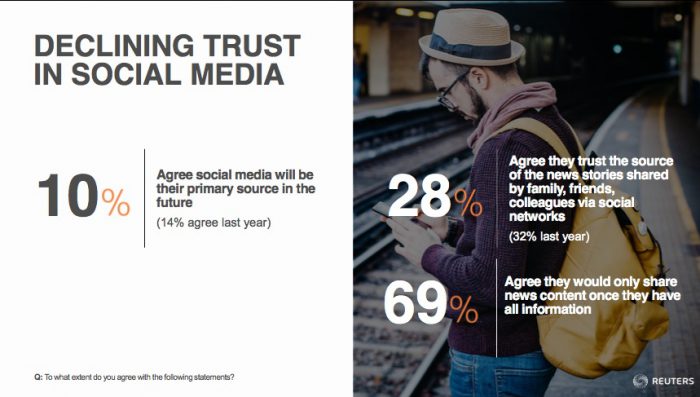When it comes to news literacy, there’s a lot to be pessimistic about these days. Plenty of people are still reading and sharing fake new stories from dubious sources, while others are wary about real news stories from legitimate ones.
But Reuters’ latest Tomorrow’s News report suggests that some readers are getting savvier about the news that they read. Of the 1,711 Reuters readers polled in early May, 74 percent “strongly” agreed that they check with sites they trust to verify breaking news stories. That’s up from 66 percent last year. Seventy-six percent said they turn to trusted news sites to verify stories they see on social media, and 88 percent said they seek out multiple news sources when big stories break.
At least in Reuters’ survey, people seemed more hesitant to rely on social media for news. Ten percent of respondents said that platforms like Facebook and Twitter will be their primary news sources in the future, down own from 14 percent last year. More, 28 percent agreed that they trust the sources of new stories shared by friends and family on social networks, which is down from 32 percent last year.

Readers, it seems, are putting a premium on trust these days. When it comes to determining what makes a news brand appealing, 57 percent said that trustworthy content is the most important factor (whether a news brand has an unbiased stance, in contrast, was named by 40 percent of people).
While the Reuters report is focused largely on readers’ views on news consumption, it also touches on how evolving reading habits, particularly those involving fake news, affect advertisers. Most respondents (67 percent) strongly agreed that advertising on news brands associated with fake news is damaging to the brand, and 93 percent said that they are more likely to read sites that don’t publish fake news.
One comment:
Great research Ricardo. I think it makes sense that people gather their news from social media because trust is being built online by seeing the feedback and reviews made by our peers. I’ve written about this in depth, and today I did a guest blog on MediaShift.org that outlines how Crowd Contested Media is the solution to our overwhelming distrust in online news. Here’s today’s newly published article on Crowd Contested Media and how our startup Tribeworthy.com just launched to create “the people’s metric”: http://mediashift.org/2017/06/trust-rated-news-peoples-metric/
I hope you give it a quick read so we can talk more. Cheers!
Trackbacks:
Leave a comment